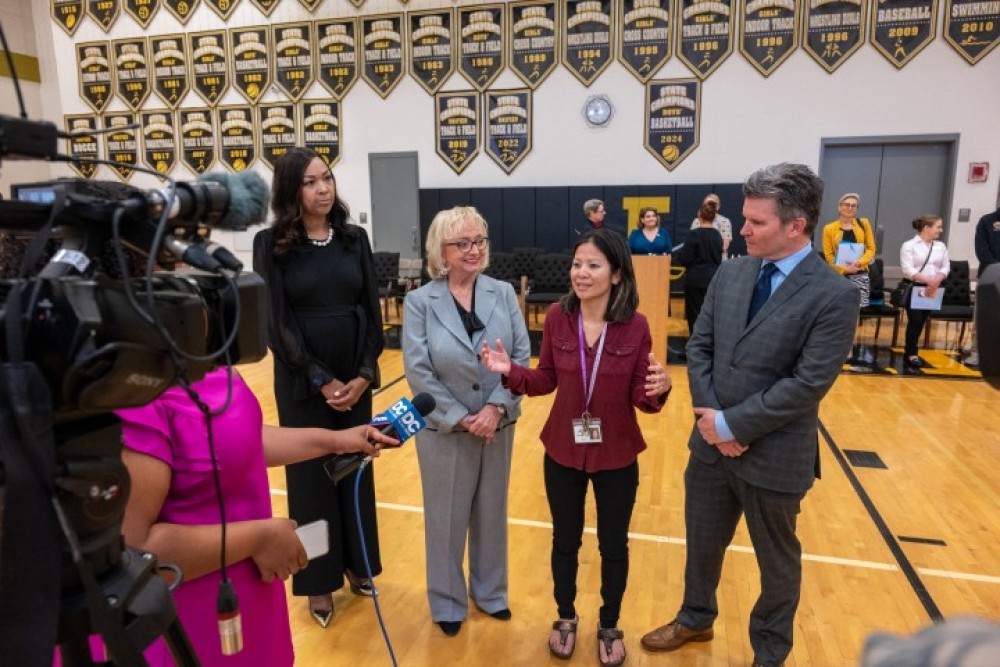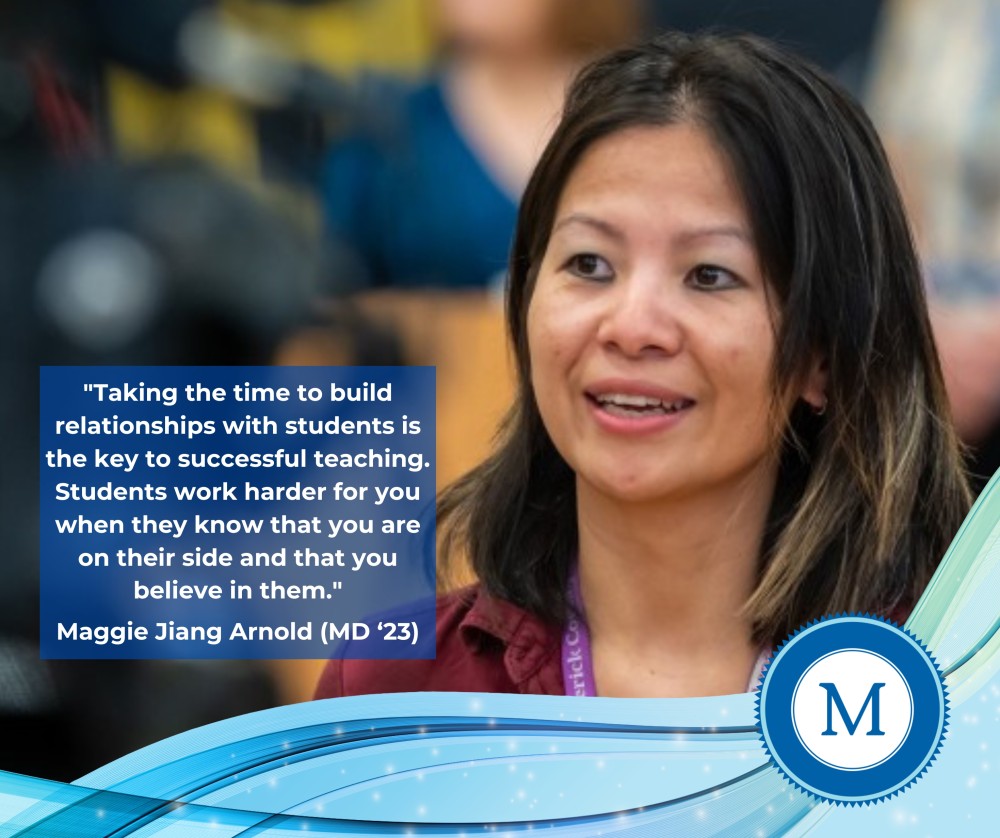Spotlight: Maggie Jiang Arnold (MD '23)
October 18, 2024
Maryland Milken Educator Maggie Jiang Arnold is a ninth through 12th grade math teacher at Frederick High School. She empowers students through innovative methods rooted in Mind Brain Education, fostering critical thinking and real world problem solving. Her commitment to building strong relationships with students and families, along with her leadership in curriculum development, has made her a respected figure in the school community. "Taking the time to build relationships with students is the key to successful teaching. Students work harder for you when they know that you are on their side and that you believe in them." Arnold received a 2023-24 Maryland Milken Educator Award in Frederick on April 18, 2024.
Milken Family Foundation: How have students responded since your Milken Educator Award surprise?
I would say that most of my students seem to appreciate me more after my Milken Educator Award surprise. Some of them also worked harder for me after I received my award, which I was very excited about. For example, in fall 2023, I had a total of seven students who completed the entire ALEKS pie. (ALEKS is an individualized math program we use in our school district). I set a goal for my spring 2024 students to beat that number, and they did not disappoint. I had a total of 10 students who completed that task. Two of these students are my multilingual learners. I am very proud of all of these students’ commitment and achievement.
MFF: Who are your role models as an educator? Is there an experience you had in the classroom as a student that shaped your practices or motivation to teach?
I have been blessed with many wonderful and supportive teachers throughout my life that ultimately shaped who I am as an educator today. Mr. Boggs, my algebra, geometry, and trigonometry teacher, was probably my earliest inspiration. I went to a small high school in Pennsylvania where I was pretty much the only minority in the entire school and the only English language learner. Mr. Boggs encouraged me to advocate for myself to get help when I did not understand the meaning of word problems, or if I needed extra time to do my test due to my language barrier. Mr. Boggs believed in me and my ability to teach when I was only in high school. This was evident when he gave my name to a parent who was looking for a math tutor. As a result, I was tutoring a sophomore when I was a senior in high school. The student I was tutoring went from a ‘D’ to a ‘B’ by the end of the year.
MFF: Tell us about your first year of teaching. What memories stand out? Who or what helped you through it?
My very first teaching experience was a long-term substitute position for math intervention at a middle school. It was by far the most challenging job that I have ever had. I was new to teaching and had no formal teacher training. Additionally, I was the fourth long-term substitute hired, so there were no routines set for students, many of whom did not like math and lacked interest in the class. This resulted in a lot of behavior problems.
Lori Hesen, the other math intervention teacher, was my saving grace. She shared all of her lesson plans and supported me emotionally every day. After getting to know the students, I knew I could not leave them until a permanent, more qualified teacher was hired. I was determined to do my very best to teach these students despite the many challenges I faced. I was there for three months, and I learned a great deal about the importance of building relationships with students and other colleagues at the school.
MFF: What do you hope students remember from their time with you?
I hope that my students remember me as a “warm demander;” someone who believes in them and pushes them to always do their best to achieve great things!
MFF: What is the secret to building students’ confidence in math, a subject with which many struggle?
Mathematics is such a beautiful subject with many real-world applications. Unfortunately, if you ask typical high school students right now, they will tell you otherwise. They see math as a bunch of numbers and calculations that have no meaning or application to their lives. This is especially true post-pandemic in the transition from virtual learning back to the classroom. Students are behind with their math skills and their attitude toward learning math has never been more negative.
To address these concerns, I believe building relationships with students and creating a safe learning environment are crucial. Students are more willing to take risks and ask questions about their learning when they feel comfortable. Knowing students' interests can be beneficial because planning relevant and meaningful lessons ultimately increases student engagement and achievement. When students experience success, they will want more!
Students need to understand that mistakes are a crucial part of the process for learning — especially in math — and that productive struggle is good for them. Having a growth mindset and knowing that they do not need to learn alone can be helpful. In my opinion, direct instruction is crucial in a math classroom; however, it cannot be the only type of instruction we provide. Students must be given the opportunities to collaborate and learn from each other. They need to see each other as resources because in math, there are often multiple ways to solve a problem. Peer discussion can lead to powerful learning because students are exposed to different approaches and perspectives. Tasks like “which one doesn’t belong” are excellent resources for that.
MFF: Your teaching philosophy is rooted in Mind Brain Education (MBE). Can you explain how you incorporate MBE, and, in turn meditation, mindfulness and metacognition, into your classroom? What impact have you seen on your students?
I have been taking a lot of professional development courses on Mind Brain Education (MBE) to help me better understand the science of learning through my school district, Frederick County Public Schools, and the Center for Transformative Teaching and Learning. I have attended the Science of Teaching and School Leadership Academy for the last three years and have earned a microcredential in the science of learning. The topics that I have studied include: learning environment and student well-being; informed design of curriculum and pedagogy; student achievement and lifelong learning; curriculum and pedagogy; and formative assessment and feedback. My knowledge with MBE has definitely made me a better and more effective teacher. As a result, I have been able to make positive impacts on student achievement because I am implementing effective research-informed strategies in my classroom. I continue to look for ways to improve my teaching and ultimately raise student achievement.
Here are some of the examples on how I incorporate MBE in my classroom:
- Formative assessment is a critical part of instruction because it allows the students to be assessed in a low or no stakes environment while providing teachers valuable data to adjust instruction and ensure successful learning prior to the summative assessment. What’s taught is not necessarily learned. Implementing retrieval practice along with feedback-driven metacognition throughout the lessons allows students to know exactly what they have and have not learned yet. Timely meaningful feedback from teachers and peers is important to help students' learning move forward.
- During the lessons, clarifying and sharing clear learning intentions and success criteria with our students is very important because it allows them to know exactly what they are supposed to learn and what success looks like. However, students must also be given the opportunity to explore and discover these learning intentions on their own. Telling them at the beginning of lessons can spoil their learning. Co-constructing success criteria with students is better and more beneficial because it is more meaningful to the students when they are part of the process. This aligns with our goal of helping students take ownership of their own learning.
- In order to improve student achievement and lifelong learning, I must help my students grow executive functions, build metacognition and foster mindsets that promote resilience and determination. The three mindsets that I incorporate are growth, belonging, and purpose and relevance. These ultimately pave the way for incorporating growth-focused feedback and praise.
- Brain breaks are important and encouraged in my classroom.
- I have had a lot of success pushing my students to work on ALEKS and doing well on their benchmarks on Performance Matters. I think my relationship with students, high expectations, evidence-informed strategies, and sharing the “what, why, and how” of our learning helps with this.

MFF: What advice would you share with people who are interested in becoming teachers?
Taking the time to build relationships with students is the key to successful teaching. Students work harder for you when they know that you are on their side and that you believe in them. Teaching is hard, but it is such a rewarding job! Make sure you find your marigolds in the place you work. Remember, teachers are brain-changers! You have the opportunity to shape and make positive impacts on students' lives. Don’t take it personally when your students are not at their best. Show them kindness and love.
MFF: Are you working on any interesting initiatives or new projects these days? Is there anything else you want to share about your school?
Research on Fostering Curiosity about Math:
This research is a collaboration between Hood College Math Professor Dr. Christy Graybeal, myself, and my Frederick High School math colleague Cindy Estep. We surveyed and interviewed students (including multilingual students) from our yearlong algebra one classes at the beginning of spring semester to see how they felt about math. We then implemented some strategies from the “Building Thinking Classrooms in Mathematics” book along with other effective strategies (including MBE strategies) throughout the semester. Dr. Graybeal finished surveying and interviewing the students after about three months of implementation. This research is still ongoing as the three of us still need to sit down to reflect on the result and use the data we collected to see what worked and what did not work. Our goal is to submit an article to a mathematics education practitioner journal or prepare slides for a conference presentation about our research.
This spring, I was given the opportunity to teach a special group of yearlong algebra 1 students. These students were identified to have the potential to be on the honors- level track, and my job was to prepare them for that challenge. I was sharing with my colleague, Cindy Estep, about my desire to help these students pass their algebra 1 MCAP in May. Cindy offered to help, so the two of us started an after-school program hoping to raise students’ passing rate/scores. We decided to run 10 review sessions after-school over a period of five weeks. With these sessions, students are taught testing strategies, given opportunities to assess what they know and don’t know in a no-stakes testing environment, and given the opportunity to ask questions to help them learn the concepts and move their learning forward. Cindy and I collaborate every week to come up with 10 hot topics from the modules that we are targeting. Once students had the opportunity to attempt these and get feedback from us, we gave them the MCAP practice questions relating to these topics to try. We don’t have the actual data to show student improvement yet; however, we are confident that these review sessions have had positive impacts on students' learning. We plan to get feedback from our students after they take the MCAP test in May so that we can reflect on and improve these review sessions for next year.
Don’t miss any new articles and updates from Milken Educator Awards:


